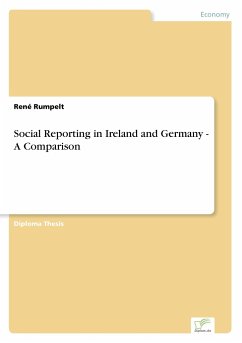Diploma Thesis from the year 2004 in the subject Business economics - Business Management, Corporate Governance, grade: 1,5, Dublin Institute of Technology (School of Marketing), language: English, abstract: Inhaltsangabe:Abstract:
Worldwide political and economic changes within the last two decades opened the way to increased globalisation. The existence of multinational organisations, together with their increasing power and influence put a threat on the political and social system.
Against this background the social responsibilities of companies together with their social reporting practice must be re-examined in order to guarantee transparency and equality between all members of society.
The following work compares the social reporting practice of two European countries Ireland and Germany. As it is not possible to conduct a representative analysis within the limiting framework of this paper, the annual reports of Fyffes and the Douglas Holding AG, issued in the same year (2002), are analysed and compared. Two Interviews were also conducted in order to show additional opinions of the current reporting practice.
To describe social reporting, the underlying idea, which is corporate social responsibility, is presented at first. Different theoretical approaches to the concept of social reporting are introduced, as well as a few operational models. The legal accounting framework of the two countries is also briefly introduced in order to show possible mandatory elements of social reporting within the legal system.
The conclusion of this paper shows that both companies report very little on their corporate social responsibility due to various reasons. Both interviewees support this finding and give additional explanations. As mentioned above, this research is not representative concerning the Irish and German social reporting practice in general and therefore is limited in its conclusions.
Inhaltsverzeichnis:Table of Contents:
List of abbreviationsiv
List of figuresvi
List of tablesvii
Abstract1
Introduction2
1.CORPORATE SOCIAL RESPONSIBILITY4
1.1Historical Perspective4
1.1.1The Origin4
1.1.2The changing scope of Corporate Responsibilities5
1.1.3The introduction of the term 'Corporate Social Responsibility'5
1.2Definition6
1.2.1Different schools of thought6
1.2.2Carroll's Model of CSR7
1.3Stakeholder Approach9
1.3.1The Business Environment9
1.3.2Framework of Stakeholder Pressure10
1.4Summary13
2.SOCIAL REPORTING15
2.1Why Social Reporting?15
2.1.1What does accountability mean?15
2.1.2Limitations of traditional accounting16
2.1.3Justifications for additional disclosures17
2.2Definition of Social Reporting22
2.2.1Systematic corporate social accounts22
2.2.2The internally and externally focussed approach23
2.2.3Principles of a reporting system24
2.3Operational Models of Social Reporting26
2.3.1International reporting and accountability initiatives26
2.3.2European reporting and accountability initiatives30
2.4Summary32
3.PRINCIPLES OF IRISH REPORTING34
3.1Legal Regulation34
3.1.1Summary of company law34
3.1.2Summary of Accounting Provisions of Legislation36
3.1.3Additional legislation influencing the content of published accounts39
3.2Irish Accounting Profession39
3.2.1Organisation of the Accounting Profession39
3.2.2Auditing requirements39
3.2.3Audit Reports40
3.3Form and content of published financial statements in Ireland41
3.3.1General overview41
3.3.2Directors' report42
3.4Irish Stock Exchange44
3.5Summary45
4.PRINCIPLES OF GERMAN REPORTING47
4.1Legal regulation47
4.1.1General Accounting Rules47
4.1.2The purpose of annual accounts50
4.1.3The German Accounting Standar...
Hinweis: Dieser Artikel kann nur an eine deutsche Lieferadresse ausgeliefert werden.
Worldwide political and economic changes within the last two decades opened the way to increased globalisation. The existence of multinational organisations, together with their increasing power and influence put a threat on the political and social system.
Against this background the social responsibilities of companies together with their social reporting practice must be re-examined in order to guarantee transparency and equality between all members of society.
The following work compares the social reporting practice of two European countries Ireland and Germany. As it is not possible to conduct a representative analysis within the limiting framework of this paper, the annual reports of Fyffes and the Douglas Holding AG, issued in the same year (2002), are analysed and compared. Two Interviews were also conducted in order to show additional opinions of the current reporting practice.
To describe social reporting, the underlying idea, which is corporate social responsibility, is presented at first. Different theoretical approaches to the concept of social reporting are introduced, as well as a few operational models. The legal accounting framework of the two countries is also briefly introduced in order to show possible mandatory elements of social reporting within the legal system.
The conclusion of this paper shows that both companies report very little on their corporate social responsibility due to various reasons. Both interviewees support this finding and give additional explanations. As mentioned above, this research is not representative concerning the Irish and German social reporting practice in general and therefore is limited in its conclusions.
Inhaltsverzeichnis:Table of Contents:
List of abbreviationsiv
List of figuresvi
List of tablesvii
Abstract1
Introduction2
1.CORPORATE SOCIAL RESPONSIBILITY4
1.1Historical Perspective4
1.1.1The Origin4
1.1.2The changing scope of Corporate Responsibilities5
1.1.3The introduction of the term 'Corporate Social Responsibility'5
1.2Definition6
1.2.1Different schools of thought6
1.2.2Carroll's Model of CSR7
1.3Stakeholder Approach9
1.3.1The Business Environment9
1.3.2Framework of Stakeholder Pressure10
1.4Summary13
2.SOCIAL REPORTING15
2.1Why Social Reporting?15
2.1.1What does accountability mean?15
2.1.2Limitations of traditional accounting16
2.1.3Justifications for additional disclosures17
2.2Definition of Social Reporting22
2.2.1Systematic corporate social accounts22
2.2.2The internally and externally focussed approach23
2.2.3Principles of a reporting system24
2.3Operational Models of Social Reporting26
2.3.1International reporting and accountability initiatives26
2.3.2European reporting and accountability initiatives30
2.4Summary32
3.PRINCIPLES OF IRISH REPORTING34
3.1Legal Regulation34
3.1.1Summary of company law34
3.1.2Summary of Accounting Provisions of Legislation36
3.1.3Additional legislation influencing the content of published accounts39
3.2Irish Accounting Profession39
3.2.1Organisation of the Accounting Profession39
3.2.2Auditing requirements39
3.2.3Audit Reports40
3.3Form and content of published financial statements in Ireland41
3.3.1General overview41
3.3.2Directors' report42
3.4Irish Stock Exchange44
3.5Summary45
4.PRINCIPLES OF GERMAN REPORTING47
4.1Legal regulation47
4.1.1General Accounting Rules47
4.1.2The purpose of annual accounts50
4.1.3The German Accounting Standar...
Hinweis: Dieser Artikel kann nur an eine deutsche Lieferadresse ausgeliefert werden.








